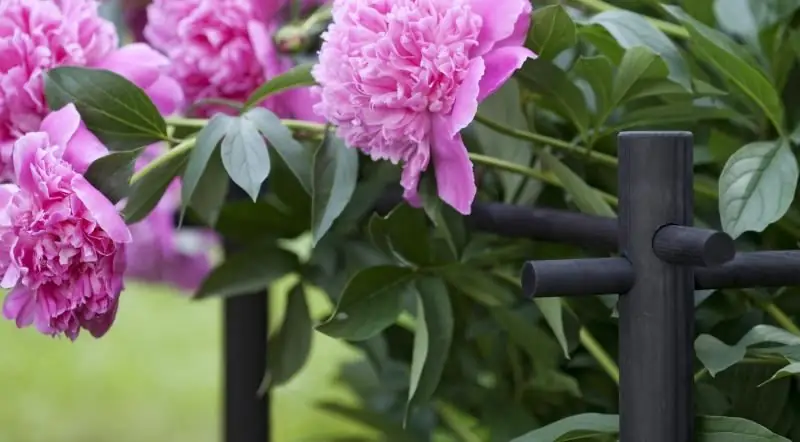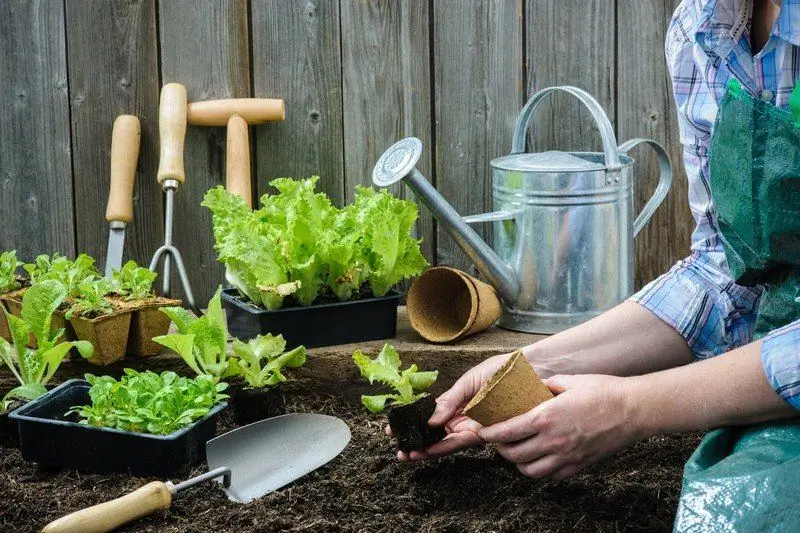
Table of contents:
- Garden strawberry Alba: characteristics and features of the variety
- Strawberries or garden strawberries?
- Brief history of the variety
- Characteristics of the garden strawberry Alba
- Table: the positive and negative aspects of growing the Alba variety
- Description of the features of planting and care
- Rules and features of reproduction of garden strawberries Alba
- Pests and diseases
- Harvesting and storage
- Gardeners reviews
- Author Bailey Albertson [email protected].
- Public 2023-12-17 12:53.
- Last modified 2025-06-01 07:32.
Garden strawberry Alba: characteristics and features of the variety

Garden strawberries are grown in summer cottages and household plots; farmers have large areas of strawberry plantations. There are many varieties of garden strawberries, they are different in characteristics, have their own methods of care, features of reproduction. The Alba variety was bred by Italian breeders, it appeared in Russia recently, but has already received positive reviews from amateur gardeners and professionals in agriculture.
Content
- 1 Strawberries or garden strawberries?
- 2 Brief history of the variety
-
3 Characteristics of the garden strawberry Alba
3.1 Video: Svetlana Tatur about the Alba variety
- 4 Table: the positive and negative aspects of growing the Alba variety
-
5 Description of the features of planting and care
5.1 Table: application periods
- 6 Rules and features of reproduction of garden strawberry Alba
-
7 Pests and diseases
7.1 Table: folk remedies for pest control
- 8 Harvesting and storage
- 9 Reviews of gardeners
Strawberries or garden strawberries?
Many gardeners are confident that they grow strawberries on their plots. However, strawberry has not received practical distribution as a cultivated plant. But in the dachas and home gardens, just garden strawberries grow. These berry bushes belong to the same genus of strawberry plants: strawberry - musky or nutmeg strawberry, garden strawberry - pineapple strawberry. Strawberry leaves are large, light green, whiskers are short and few. A feature of strawberries is the presence of male and female bushes (the plant is bisexual), as a result of which the yield of strawberries is much lower than that of garden strawberries. Shaded, humid places are favorite for strawberries, in contrast, strawberries are drought tolerant and like sunny areas, the berries are large and juicy.

Large fruits of garden strawberries and small strawberries
Brief history of the variety
In 2003, the Italian breeding company New Fruits from the city of Cesena developed the Alba strawberry variety. The Italian origin of the Alba variety did not prevent the garden strawberries from taking root very well in Russia and establishing themselves as a productive variety, universal in use. Alba can be eaten fresh immediately after harvesting, and after transportation, and processed (jams, compotes and other canned foods), and is also suitable for freezing.

The fruits of the garden strawberry Alba are universal, suitable for transportation and freezing.
Characteristics of the garden strawberry Alba
The yield of garden strawberries Alba is about 1.2 kg from each bush. The variety is classified as early ripening, in a greenhouse on a closed ground, the first berries begin to be picked already in the twenties of April, the cultivation of berry bushes on land plots without shelter gives the berries ripening 20-30 days later.
The height of the bush reaches 30-35 cm, the rosette is slightly leafy with large leaves, a large number of mustaches. The variety is drought-resistant, winters well. Alba is resistant to root diseases and powdery mildew. The fruits are bright red, fragrant. The average weight of one berry is 30 g, there may be larger sizes (up to 50 g). The fruits have an elongated conical shape, have a sweet and sour taste. Alba is well stored, transported without loss. The harvested berries can be used both fresh and processed into various canned foods.
Video: Svetlana Tatur about the Alba variety
Table: the positive and negative aspects of growing the Alba variety
| Benefits of the variety | Disadvantages of the variety |
| High yield | Long rest period |
| Long fruiting period (May - June) | One fruiting period |
| Drought tolerance, resistance to diseases of the root system and powdery mildew | Susceptibility to anthracnose |
Description of the features of planting and care
Garden strawberries prefer areas that are protected from drafts and well-lit by the sun. A positive result is given by planting strawberry seedlings in areas where cereals, garlic, onions, as well as flowering plants - marigolds and petunias were grown before it. Garden strawberries on such a plot of land will grow well for the first four years and bring an excellent harvest. It is allowed to plant berry bushes of garden strawberries of the Alba variety both in spring and autumn. But plants planted in the autumn will give the first fruits in the spring, and the appearance of berries on the bushes for spring planting should be expected in a year. Prepare the soil in advance. At the rate of one square meter of soil, humus (8-10 kg) or manure (5 kg), superphosphate (100 g) and potassium salt (50 g) are introduced. It is better to plant plants during the period when it rains,overcast and no bright sun. First, the seedlings should be kept in a cool room for several days. The distance between the beds should be about 30-40 cm. The distance between the bushes in the garden should be 20-30 cm. The root collar of the rosette should be at ground level. After that, you should cut off the leaves, leaving 3-4 of the largest.
A positive quality of garden strawberries of the Alba variety, which distinguishes them from other varieties, is drought resistance. If other varieties require watering every 3-4 days, then Alba should be watered after 5-6 days. To achieve a good harvest and preserve berry bushes, fertilizing and periodic processing of plants should be carried out.
Table: application periods
| Period | Fertilizers |
| Early spring, leaf pruning done |
1/2 l of mullein infusion (1:10) or chicken manure (1:12) per bush Boric acid, ammonium molybdate, potassium permanganate (2 g per 10 l of water) - foliar dressing |
| Budding period and fruiting | Spraying with boric acid solution (2 g per 10 l of water) |
| After harvest, trimming the leaves | Application of a solution of nitroammophoska (2 tbsp. L. Per 10 l of water) |
| August | Application of urea solution (30 g per 10 l of water) followed by irrigation |
Rules and features of reproduction of garden strawberries Alba
You can propagate garden strawberries with a mustache, seeds and dividing the bushes into several parts.
Mustache trimming begins in June, at the end of the month. Then the resulting planting material is transplanted into separate small pots with soil for strawberry seedlings. Place the seedlings in a place that is protected from drafts and well lit by the sun. It is necessary to maintain good soil moisture in pots with seedlings, but not overfilling the plants. In September, mature strawberry bushes are planted in a permanent place in open ground.

Mustache propagation is the easiest and most commonly used method
In order to divide the bush, choose plants 2-3 years old, divide into two or three parts with a sharp knife, leaving a rosette with leaves in each share of the bush being divided. Before work, the knife should be disinfected in a solution of potassium permanganate. Then the plants are planted in the holes that were previously prepared.

Dividing the bush helps rejuvenate the planting of garden strawberries
Pests and diseases
Alba is resistant to powdery mildew and some fungal diseases. However, the variety is prone to anthracnose. This usually happens in rainy weather. First, small spots appear on the leaves, gray on the inside and burgundy on the outside. Then they grow. The bush can dry out completely. As a prophylaxis, a solution of potassium permanganate or Bordeaux liquid should be used before planting in the ground, dipping the seedlings into it for 30 minutes. If signs of anthracnose are found, Anthracol, Metaxil or Quadris should be used. If the process is started, you will have to remove all the bushes from the garden and treat the soil with a solution of Bordeaux liquid (1%).

Anthracnose quickly infects the whole plant
Another enemy is aphids. To combat aphids, you can use both folk remedies (soap foam, infusions of tomato and potato tops, tobacco and wood ash), and chemicals based on natural organic components.

Aphids are dangerous because draws out all the juices from the plant
To combat the weevil, spraying with a solution of potassium permanganate (5-7 g per 10 l of water) is used

The weevil is well scared off by planting onions and garlic next to garden strawberries
A good effect in the fight against brown and white spot is given by spraying with nitrophen (50 g: 10 L of water) or Bordeaux mixture (300 ml per 10 L of water)

White spot is a fungal disease that must be fought
Table: folk remedies for pest control
| Pests | Means used to combat |
| Aphid |
|
| Weevil |
|
Harvesting and storage
The fruiting period of the garden strawberry Alba begins in May, in the second half of the month, and in the territories located in the south of Russia, the harvest continues all summer. The berry is dense, therefore it withstands transportation well. After removing from the bushes, the berries retain their freshness for up to four days, the fruits packed in cardboard boxes and placed in the refrigerator are stored for a week, in the freezer the storage period of the harvested crop is increased to eight months.

The fruit of the garden strawberry Alba can reach a weight of 50 g
Gardeners reviews
There are many reviews of the garden strawberry variety Alba. It pleases some with its high yield and very early dates for obtaining the first harvest, others note the insufficiently bright taste of the fruits.
The garden strawberry variety Alba will delight gardeners and summer residents in the European part of Russia, the Urals and Siberia. Undemanding care and high yields are the features of this variety, distinguishing it from others.
Recommended:
Garden Strawberry Variety Tsaritsa - Features, Care And Other Important Aspects + Photo

Description of the garden strawberry variety Tsaritsa. Advantages and disadvantages. Planting, care and reproduction. Disease and pest control. Harvesting. Gardeners reviews
Garden Strawberry Victoria - Features Of The Variety And Important Nuances Of Growing + Photo

Strawberries or strawberries? And also about Victoria over common sense
Chamora Turusi Variety Of Garden Strawberries - Features, Care And Other Important Aspects, The Difference Between Strawberries And Garden Strawberries + Photo

Everything about the Chamora Turusi strawberry variety: from planting and care to picking berries. Productivity, terms of fruiting, reviews of gardeners
Fences For Garden Beds With Your Own Hands - How To Make A Fence For A Front Garden, Flower Garden Or Vegetable Garden, Step By Step Instructions With A Photo

Options for fences for a suburban area. Their pros and cons. How to install a holder for plastic bushes, a flower bed from bottles: step by step instructions. Video
What Can Be Planted In June In The Country: Plants For The Garden, Vegetable Garden And Flower Garden

Plants suitable for planting in the garden in June are greens, roots, other vegetables, flowers. What can be planted in open ground and in a greenhouse. Gardener's recommendations
